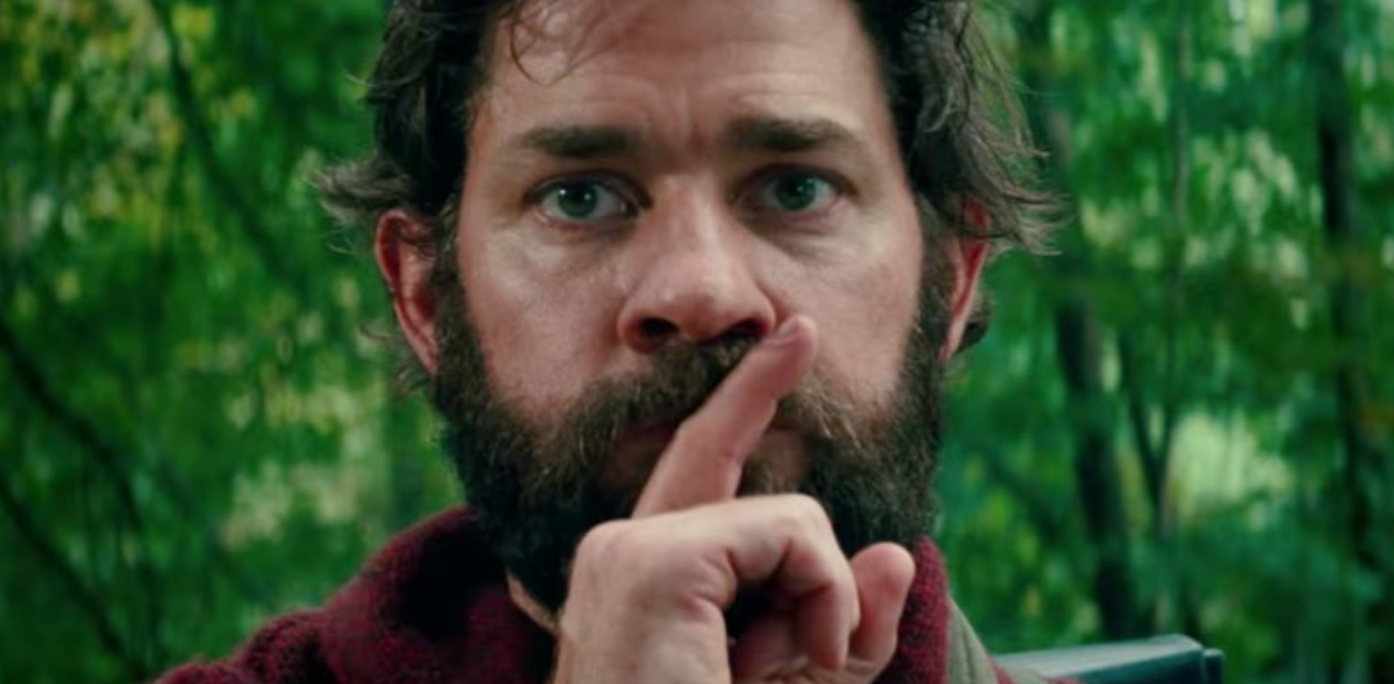Thierry Fremaux and the Cannes Film Festival team are seeing movies all this weekend in Paris as well as on Monday (4.9), Tuesday (4.10) and Wednesday (4.11) next week. Their viewing eyeballs will be bleeding right up until next Thursday’s press conference announcing the official slate. You wouldn’t think that things would be all that fluid right now, but they are.
Day: April 6, 2018
Paying The Price
Update: John Krasinski’s A Quiet Place is an exceptional, top–tier horror–thriller. I saw it late Friday afternoon and realized immediately that my initial reluctance to give it a chance was misplaced. It has some logic problems but the over-riding silence element is brilliant and in fact riveting.
Earlier: I didn’t want to see A Quiet Place that much, to be honest, and so I forgot to remember to attend the 3.29 all-media at the Arclight. Now it’s playing and projected to make $40 million this weekend, and so I have no choice but to pay to see the damn thing at the Grove, and before 4pm if I can. Because I obviously don’t want to be silent or out of the game. I’m not looking forward to this. I’m really not. Grim up, pay up and take it. Martin Ritt‘s Sounder.
“The Battle of Britain” w/ Kenneth More
In a 4.3 podcast interview with The Moment‘s Brian Koppleman, Beirut screenwriter Tony Gilroy talks for the first time about the re-writing and re-shooting of Rogue One. Key Gilroy quote: “I came in after the director’s cut [and] I have a screenplay credit in the arbitration that was easily won.” Indeed — the WGA wouldn’t have given Gilroy that credit unless his rewrite was fundamental.
Gilroy quote #2: “I don’t think Rogue One is a Star Wars movie in many ways…to me it’s a battle of Britain movie.”
Gilroy quote #3: “There were no assholes involved in the process at all, on all the upper level, there were no assholes, it was just a mess [and there was] fear, and they had just gotten themselves…and because it wasn’t really my movie…for a while, I slept every night. For my own movie, I wouldn’t sleep, but because it was somebody else’s movie…”
Gilroy quote #4: “At a certain point, it kinda tipped, at a certain point everybody’s looking at you like, [ya gonna fix this or what?], but through a lot of it I was pretty calm, I was pretty chill.”
Gilroy quote #5: “I was in London, I was having a great time every day, I was throwing strikes every day, I was so happy to be engaged, my endorphins were firing, I was happy with what I was doing in front of me, I had…my god, [the production resources], it’s a Ferrari, man, oh my God. I had a great time.”
Lazy Drug-Dealing Movie…No Snap!
The best thing about Bill Norton‘s Cisco Pike (’72) is the copy line on the poster — “Cisco Pike is a man of the west — West L.A.!” I worship the fact that (a) the line means absolutely nothing, and that (b) it’s so Los Angeles-centric that it couldn’t have possibly have resonated with moviegoers in Cincinatti, Atlanta, Waco, Honolulu or Perth Amboy. Really a hilarious copy line, especially if you say it over and over.
Is Cisco Pike any good? I have only the vaguest of recollections, but the trailer alone strong suggests it has almost no propulsive narrative energy. It does, however, offer a fascinating look at the ultra-polluted Los Angeles (particularly Venice) during the old druggy days.
Inherent Vice sought to recreate this pot-haze atmosphere or more precisely a Manhattan and Venice Beach milieu of ’69; Cisco Pike (released in January ’72, shot in the spring and summer of ’71) delivers it first-hand. You can’t stream it — it’s only viewable on a decade-old DVD.
I may be the only film critic who half-liked Norton’s More American Graffiti.
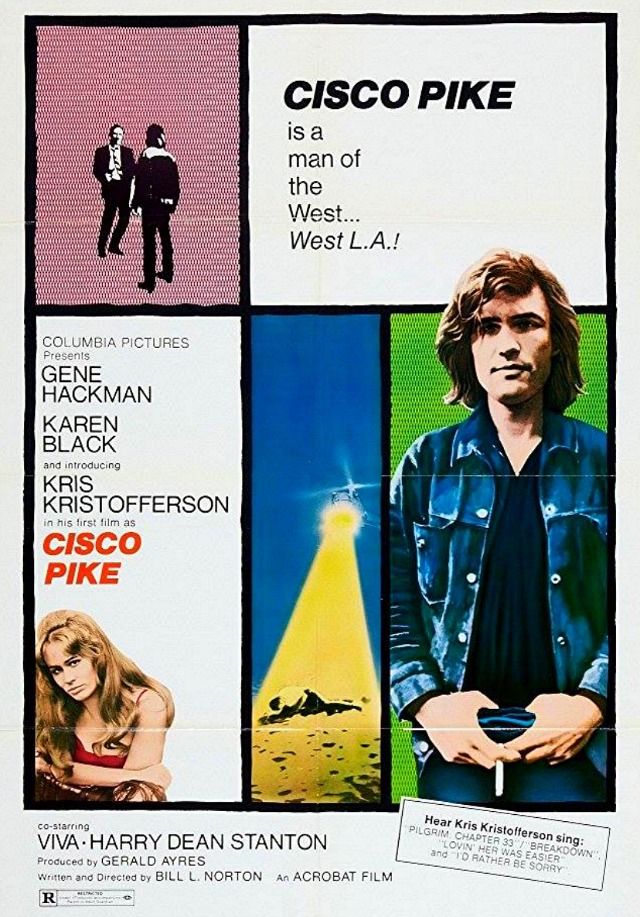
Orson Welles Has a Date in Cannes
“Sources” have told The Hollywood Reporter‘s Gregg Kilday and Kim Masters “that Netflix has threatened not to bring any titles” to the Cannes Film Festival “after festival director Thierry Fremaux said last month that he won’t screen any Netflix films in competition.”
Update: Alfonso Cuaron‘s Roma is a Netflix film, which was news to me until an hour ago. It was apparently slated to screen in Cannes Competition, but now it might not.
Masters and Kilday say that “the situation is said to be fluid, and a final decision won’t be made until Cannes announces its official lineup [on] April 12” — i.e., six days hence.
The story implies that “if Netflix carries through on the threat to pull its movies”, three Netflix films — Paul Greengrass‘ Norway, Jeremy Saulnier‘s Hold the Dark and Orson Welles‘ The Other Side of the Wind — could be no-shows.
The story says “it is not clear which [of these films] may have been formally submitted,” although everyone understands that The Other Side of the Wind has already been slotted for the Cannes Classics section.
Nobody knows anything, but I’ll be hugely surprised if the Welles film — shot in the early ’70s but only recently assembled in full after years of delay — doesn’t play as a Cannes Classics attraction. This has been in the cards for many months. I am therefore not buying the Masters/Kilday story as far as this title is concerned. I’m not saying “no way, Jose” but it’s very unlikely.
The Remembering
Almost exactly 38 years ago, I took cartoonist Chris Browne to an early press screening of The Shining. The old Warner screening room at 75 Rockefeller Plaza, I mean, on the eighth floor. Plush, nicely carpeted, 103 seats.
Browne has been drawing the “Hagar the Horrible” strip since ’88, and is quite the guy in cartoonist circles. But he was in a not-yet place back in ’80.
We were shown the slightly longer version that ended with Overlook manager Barry Nelson visiting Shelley Duvall in a hospital room after Jack Nicholson‘s frozen-icicle death. Like Steven Spielberg after his initial viewing, I wasn’t all that knocked out. It was only years later, having watched The Shining for the eighth or twelfth time (who remembers?), that I realized it had seeped into my system and taken hold in some curious way.
A few critics were there along with Buck Henry (glasses, tan baseball cap), Malcolm McDowell and Mary Steenburgen.
As soon as the lights came up Browne whipped out his sketch pad and, in the space of two or three minutes, drew a cartoon of Henry and his friends in their seats, their eyes wide with terror and with little piss puddles on the floor below. Browne went up to Henry in the downstairs lobby and showed him the drawing. I can recall Henry’s dryly bemused expression with absolute clarity.
Yesterday I wrote Chris on Messenger and asked if he still had that drawing. If so I asked if there was a chance he could scan it and send it my way. Or, failing that, if could he re-draw it and send it along. (As noted, the original only took him three minutes to draw it inside the screening room.) Chris graciously agreed to re-draw it but (a) without McDowell or Steenburgen, and (b) without the pee puddles. So here’s Buck again, and here’s to the lightning-fast creative derring-do of Chris Browne.
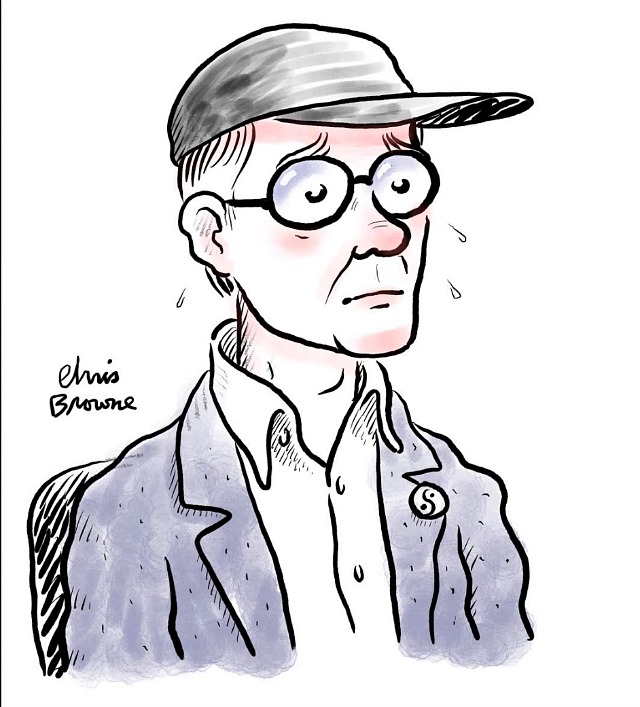
Gabler’s “Chappaquiddick” Piece Sidesteps Specifics
Author and historian Neal Gabler, currently writing a biography of the late Sen. Edward Kennedy, has penned a dismissive N.Y. Times article about John Curran‘s Chappaquidick, which opens today. The film delivers a reasonably frank account of Kennedy’s July 1969 car accident that resulted in the death of campaign worker Mary Jo Kopechne. Gabler’s piece is titled “How Chappaquiddick Distorts a Tragedy,” but it doesn’t explain this in any detail.
Gabler merely states that Joseph P. Kennedy was too incapacitated by a stroke to mutter “alibi,” that “many scenes cross from dramatic interpretation to outright character assassination,” and that that Kennedy, whose “first words after the accident are ‘I’m not going to be president’,” is portrayed as “callow, cunning, cowardly and self-interested yet moronic.”
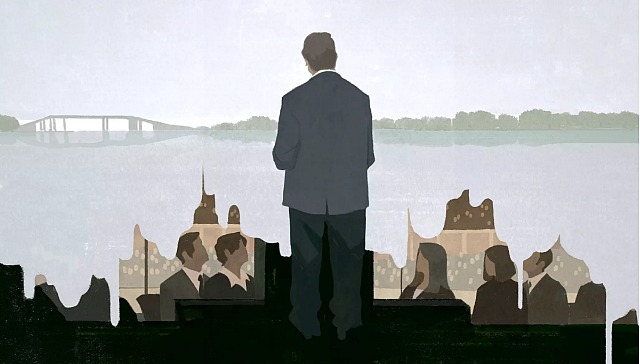
Maybe, but for an essay that promises to explain how Curran and screenwriters Taylor Allen and Andrew Logan have distorted history, Gabler offers few specifics.
He basically concludes that the film is “not factual,” “fake history,” that it “eviscerates” Kennedy “for narrow voyeuristic aims.”
Gabler excerpt #1: “Let’s set aside the fact that, despite the film’s advertisements claiming to tell the “untold true story” of a “cover up,” the story has been told plenty, and no one but the most lunatic conspiracy theorists see this as anything but a tragic accident in which nothing much was covered up.”
Gabler excerpt #2: “Contrary to the film’s implications, Kennedy immediately and forever after felt deep remorse and responsibility for the accident; it haunted him. By the end of his life, however, the then white-maned senator had managed to transcend celebrity and emotional paralysis and become what he had long aspired to be: an indispensable legislator whose achievements included the 18-year-old vote, the Americans With Disabilities Act and the Children’s Health Insurance Program.
Pruitt Is Wounded, Bloodied
This strikes me as a smart, perceptive take on the Scott Pruitt situation (i.e., travel, housing, raises). Cenk Uygur is entirely correct in saying that Fox News’ Ed Henry would never subject Pruitt to this kind of brutal interview unless someone in the Trump administration had given Henry a green light.
Uygur: “Do you see Fox News go after Republican officials all the time? No, you almost never see that. You see them do that to Trump administration officials? Almost never. So why are they doing it in this case? Because, there is someone bigger in the Trump administration that said go ahead, we’re done with him.”
“When you lose power then all of a sudden the press are lions,” Uygur declares. “When you have power, the press are lambs.”
Ehrenreich Facing Cote d’Azur Gauntlet
It was announced this morning that Ron Howard‘s Solo: A Star Wars Story, the most negative-buzz-plagued Star Wars movie in the history of the franchise, will screen out-of-competition during the Cannes Film Festival. The screening will happen on Tuesday, 5.15, or ten days before the U.S. debut and eight days before the French opening.
It’s not certain that Alden Ehrenreich, the too-short, charisma-challenged, completely miscast actor who had to be professionally coached in a seemingly desperate effort to capture the insouciant vibe and commanding physicality of young Harrison Ford, will be roasted by the Cannes press contingent. But the knives will be out, you bet.
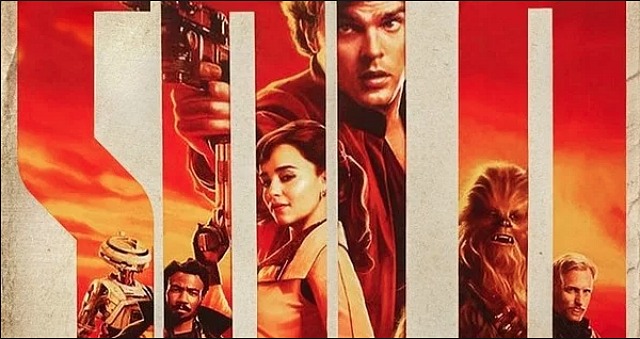
Then again Disney probably wouldn’t offer Solo for a big Cannes screening if they weren’t at least somewhat confident that it satisfies on its own terms, Aldrenreich’s shortcomings notwithstanding.
Solo costars Woody Harrelson, Emilia Clarke, Donald Glover, Thandie Newton, Phoebe Waller-Bridge, Joonas Suotamo and Paul Bettany.
Exec producers Phil Lord and Christopher Miller, who directed Solo for for four and 1/2 months before being canned by producer Kathy Kennedy over creative differences, will presumably attend the red-carpet ceremony along with Kennedy, director Ron Howard, screenplay authors Lawrence and Jonathan Kasdan, producer Simon Emanuel and executive producer Jason McGatlin.
The Cannes Film Festival runs from Tuesday, 5.8 thru Saturday, 5.19. The slate will be announced on Thursday, 4.12.

